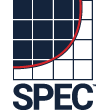|
SPECopc demonstrates SPECviewperf 9
Latest industry-standard benchmark includes new viewsets;
features that tighten correlation to performance in real world
LOS ANGELES, August 3, 2005 – SPEC/GPC’s OpenGL Performance Characterization (SPECopc) project group today announced and demonstrated SPECviewperf 9, a new version of the standardized performance evaluation software for systems running popular CAD/CAM, digital content creation, and visualization applications. The announcement was made at a press conference during SIGGRAPH 2005. SPECopc expects the new software to be available within the next two to four months.
SPECviewperf 9 will include at least three new or updated viewsets – the test files that represent a similar mix of graphics rendering and manipulation found in actual applications. Currently planned viewsets represent recent versions of Maya, VisMockup, 3ds max, and UGS ’s NX3.
A significant new feature change in SPECviewperf 9 is the ability to use of gl DrawElements instead of gl ArrayElement s within the Maya 6.5 viewset . With the change, SPECviewperf This now follows the same OpenGL command stream accurately reflects the same OGL usage as to increase efficiency and use memory in the same way it is the used in Maya 6.5 application application s such as Maya 6.5. The Other changes enable memory use and allocations within SPECviewperf 9 that better follow the application. Vertices can be shared within glDrawElement and glDrawArray primitives, for example, as they are in the actual application. and F f uture viewsets will be based on Pro/E Wildfire will also use DrawElements .
With SPECviewperf 9, SPECopc has also taken steps to ensure that 64-bit applications are truly being run in 64-bit mode, and not being handled in the 32-bit space. The change will make 64-bit performance measurements within SPECviewperf correlate closer to those found in day-to-day practice.
“SPECviewperf 9 might just give synthetic benchmarks a good name,” says Ian Williams, SPECopc chair. “We’ve taken a very good benchmark and made it better by adding and updating viewsets , and to bring ing ing the testing environment s s closer to their corresponding applications. Updated The new v Viewsets such as the such as the new one based on Maya 6.5 will are intended to exhibit show the same the realistic differences in performance among between various levels of graphics cards as shown by the applications themselves.”
About SPECviewperf
SPECviewperf measures the 3D rendering performance of systems running under the OpenGL application programming interface (API). The benchmark’s viewsets represent a similar mix of graphics rendering and manipulation found in actual applications. Current viewsets represent graphics functionality in CATIA, Pro/ENGINEER, SolidWorks, Unigraphics, 3ds max, Maya, EnSight and Lightscape applications.
About SPECopc
SPECopc is a project group of the Graphics Performance Characterization (GPC) Group, which in turn is part of the Standard Performance Evaluation Corp. (SPEC). SPEC is a non-profit corporation formed to establish, maintain and endorse a standardized set of relevant benchmarks that can be applied to the newest generation of high-performance computers. SPEC’s membership includes computer hardware and software vendors, and leading universities and research facilities worldwide. For more information, visit: www.spec.org.
###
Press contacts:
Bob Cramblitt, Erin Hatfield
Cramblitt & Company
919-481-4599; info@cramco.com
|




